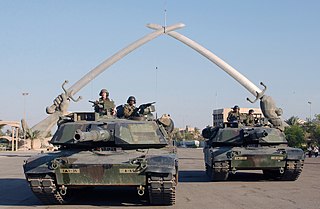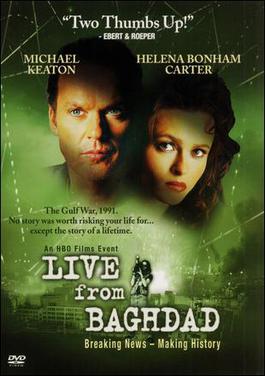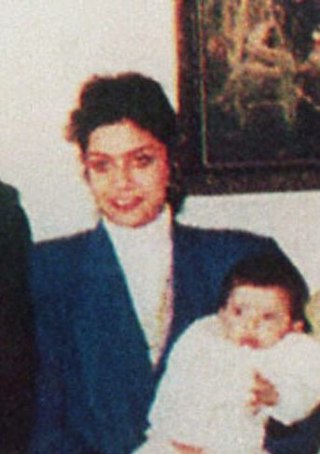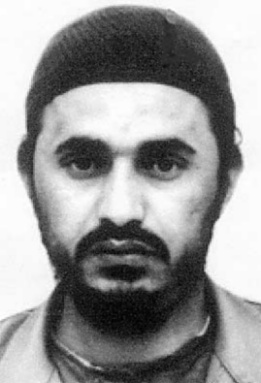
Saddam Hussein was an Iraqi politician and revolutionary who served as the fifth president of Iraq from 1979 to 2003. He also served as prime minister of Iraq from 1979 to 1991 and later from 1994 to 2003. He was a leading member of the revolutionary Arab Socialist Ba'ath Party and later its Iraqi regional branch. Ideologically, he espoused Ba'athism, a mix of Arab nationalism and Arab socialism, while the policies and political ideas he championed are collectively known as Saddamism.

This is a timeline of the events surrounding the United States-led invasion of Iraq in 2003.

Tariq Aziz was an Iraqi politician who served as Deputy Prime Minister (1979–2003), Minister of Foreign Affairs (1983–1991) and a close advisor of President Saddam Hussein. Their association began in the 1950s when both were activists for the then-banned Arab Socialist Ba'ath Party. He was both an Arab nationalist and a member of the Chaldean Catholic Church.

The 2003 invasion of Iraq was the first stage of the Iraq War. The invasion began on 20 March 2003 and lasted just over one month, including 26 days of major combat operations, in which a United States-led combined force of troops from the United States, the United Kingdom, Australia and Poland invaded the Republic of Iraq. Twenty-two days after the first day of the invasion, the capital city of Baghdad was captured by coalition forces on 9 April after the six-day-long Battle of Baghdad. This early stage of the war formally ended on 1 May when U.S. President George W. Bush declared the "end of major combat operations" in his Mission Accomplished speech, after which the Coalition Provisional Authority (CPA) was established as the first of several successive transitional governments leading up to the first Iraqi parliamentary election in January 2005. U.S. military forces later remained in Iraq until the withdrawal in 2011.

Iraq under the Arab Socialist Ba'ath Party saw severe violations of human rights. Secret police, state terrorism, torture, mass murder, genocide, ethnic cleansing, rape, deportations, extrajudicial killings, forced disappearances, assassinations, chemical warfare, and the destruction of the Mesopotamian marshes were some of the methods Saddam Hussein and the country's Ba'athist government used to maintain control. Saddam committed crimes of aggression during the Iran–Iraq War and the Gulf War, which violated the Charter of the United Nations. The total number of deaths and disappearances related to repression during this period is unknown, but is estimated to be at least 250,000 to 290,000 according to Human Rights Watch, with the great majority of those occurring as a result of the Anfal genocide in 1988 and the suppression of the uprisings in Iraq in 1991. Human Rights Watch and Amnesty International issued regular reports of widespread imprisonment and torture.

The Iraqi no-fly zones conflict was a low-level conflict in the two no-fly zones (NFZs) in Iraq that were proclaimed by the United States, United Kingdom, and France after the Gulf War of 1991. The United States stated that the NFZs were intended to protect the ethnic Kurdish minority in northern Iraq and Shiite Muslims in the south. Iraqi aircraft were forbidden from flying inside the zones. The policy was enforced by the United States and the United Kingdom until 2003, when it was rendered obsolete by the 2003 invasion of Iraq. French aircraft patrols also participated until France withdrew in 1996.

The Battle of Baghdad, also known as the Fall of Baghdad, was a military engagement that took place in Baghdad in early April 2003, as part of the invasion of Iraq.

The 2003 invasion of Iraq involved unprecedented U.S. media coverage, especially cable news networks.

The following is a timeline of major events during the Iraq War, following the 2003 invasion of Iraq.

Live from Baghdad is a 2002 American television war drama film directed by Mick Jackson and co-written by Robert Wiener, based on Wiener's book of the same title. The film premiered on HBO on December 7, 2002, during the prelude stage of the Iraq War.

Ayad Allawi is an Iraqi politician. He served as the vice president of Iraq from 2014 to 2015 and 2016 to 2018. Previously he was interim prime minister of Iraq from 2004 to 2005 and the president of the Governing Council of Iraq in 2003.

An Iraqi insurgency began shortly after the 2003 American invasion deposed longtime leader Saddam Hussein. It is considered to have lasted until the end of the Iraq War and U.S. withdrawal in 2011. It was followed by a renewed insurgency.

Raghad Saddam Hussein is an Iraqi in exile and the eldest daughter of former Iraqi ruler Saddam Hussein.
The following lists events in the year 2003 in Iraq.

The Human Shield Action to Iraq was a group of people who traveled to Iraq to act as human shields with the aim of preventing the U.S.-led coalition forces from bombing certain locations during the 2003 invasion of Iraq.
Events in the year 2005 in Iraq.
The Saddam–al-Qaeda conspiracy theory was based on false claims by the United States government alleging that a secretive relationship existed between Iraqi president Saddam Hussein and the Sunni pan-Islamist militant organization al-Qaeda between 1992 and 2003. U.S. president George W. Bush used it as a main reason for invading Iraq in 2003.

Abu Musab al-Zarqawi, born Ahmad Fadeel al-Nazal al-Khalayleh, was a Jordanian militant jihadist who ran a training camp in Afghanistan. He became known after going to Iraq and being responsible for a series of bombings, beheadings, and attacks during the Iraq War, reportedly "turning an insurgency against US troops" in Iraq "into a Shia–Sunni civil war". He was sometimes known by his supporters as the "Sheikh of the slaughterers".

The Royal Tulip Al Rasheed Hotel is an 18-story hotel in Baghdad, Iraq, often visited by journalists and media personnel due to its location within Baghdad's Green Zone. It is named after the eighth century Caliph Harun Al-Rashid. It has been a focal point in a number of conflicts in the region, most recently the 2003 U.S. invasion of Iraq.

Ra'ad Majid Rashid al-Hamdani is a retired Iraqi military officer and former General of the Iraqi Republican Guard, and was one of Saddam Hussein's favourite generals.

















